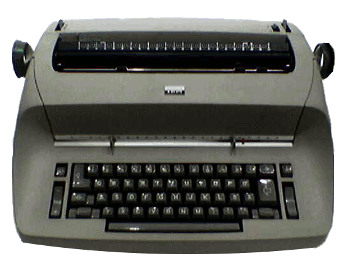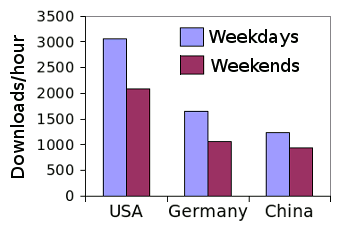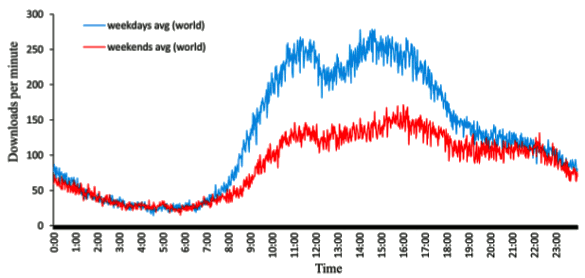All Work and No Play
November 29, 2013
As a
graduate student working on
funded programs in the
1970s, I was fortunate to have a practically unlimited budget for
computer time. However, getting access to a computer was another thing altogether. Those were the days of
mainframes and
timeshare terminals, and I had to compete for access with students in
computer courses hacking out their
homework assignments. I solved the problem the way most computer people did in those days. Much to my
wife's consternation, I worked very late at night.

The IBM 2741 printing computer terminal I used during my graduate student days looked a lot like an IBM Selectric typewriter, as pictured.
(Photo by Oliver Kurmis, via Wikimedia Commons.)
There's a joke about a
computer programmer's being invited to an eight o'clock meeting. "I don't stay up that late," was his response. Now, everyone has one or more
personal computers, so such access problems should be solved. Maybe not completely, since we're all wired into the
Internet, competing for the attention of the same
servers.
At my former place of
employment, it was nearly impossible to access some
database applications at peak times. The cost of lost
productivity likely exceeded by many fold the cost of more and better servers. But servers are a
capital investment, so their cost is logged in a different
spreadsheet.
Working long hours and after hours was a common part of the graduate school experience in
my generation. In the most successful students, these habits carried forward into their subsequent
professional lives, whether in
academia or
industry. One example of this in my field of
materials science was the
mad scramble to innovate after the initial discovery of
high temperature superconductivity by
Bednorz and
Müller in 1986.
There was sufficient
anecdotal evidence for
scientists' being
workaholics that a
research team from the
Dalian University of Technology (Dalian, China) decided to do a
scientific study of scientist work habits in 2012.[1] They recorded the
download information of
scientific papers from the major scientific
publisher,
Springer. They focused attention on the three
countries with the greatest number of downloads; namely, the
United States,
Germany and
China. These countries had more than 54% of the worldwide downloads. Not surprisingly, they found that many of us work far into the
night, and on
weekends (see graph).[1]

Downloads of scientific papers, per hour, between 8:00 AM and 11:00 PM.
(Data graphed by the author using Gnumeric, from data in ref. 1.[1]
As can be seen in the graph, scientists in China have the greatest weekend access (76.95% of weekdays), compared with the US (68.21%) and Germany (64.17%). It was found that US scientists were more likely to work overnight, whereas Chinese scientists work more on weekends.
This same research team has extended this study in a recent
arXiv posting.[2] In this new work, they used the same database to examine the hourly work habits of scientists in thirty countries extending throughout
Europe,
Asia,
Australia,
North America,
Latin America and
Africa. The following table shows the downloads logged during the research study.[2]
The authors found that there are regional differences in scientist work habits, but all scientists are too often working overtime. By doing this, they're impacting their
health by not engaging more often in
hobbies, other
leisure activities, and regular
exercise. Indeed, the authors mention an "unwritten rule" that
academics are expected to work
overtime.[2]
Most interesting were the time-of-day download data shown in the following figure.[2]

Scientific downloads per minute as a function of the local time of day. (Fig. 3b from ref. X, via arXiv.)
Lunch break, around
noon, is seen in the data, as well as considerable work in the early hours after
midnight. One interesting result of the detailed data analysis by country is that
Austrian scientists seem to work equally long on weekends as weekdays. This research was supported by the "Social Science Foundation of China" project (10CZX011) and the "Fundamental Research Funds for the Central Universities" project (DUT12RW309).[2]
.jpg)
A 1689 oil portrait of Isaac Newton by Sir Godfrey Kneller (1646-1723).
It's quite unlikely that Newton worked on Sunday, since he wrote about having guilty feelings for "Sabbath-breaking."
In 1662, at age 19, Newton compiled a list of all the sins he could remember in his lifetime, and this short list included "Making pies on Sunday night."[3]
(Via Wikimedia Commons.)
![]()
References:
- Xianwen Wang, Shenmeng Xu, Lian Peng, Zhi Wang, Chuanli Wang, Chunbo Zhang and Xianbing Wang, "Exploring scientists' working timetable: Do scientists often work overtime?" arXiv Preprint Server, August 13, 2012.
- Xianwen Wang, Lian Peng, Chunbo Zhang, Shenmeng Xu, Zhi Wang, Chuanli Wang and Xianbing Wang, "Exploring Scientists' Working Timetable: A Global Survey," arXiv Preprint Server, October 22, 2013.
- Isaac Newton's Personal Life, The Newton Project, University of Sussex.
Permanent Link to this article
Linked Keywords: Postgraduate education; graduate student; funding of science; funded program; 1970s; time-sharing; computer time; mainframe computer; timeshare; computer terminal; computer literacy; computer course; homework assignment; wife; IBM 2741 printing computer terminal; IBM Selectric typewriter; Oliver Kurmis; Wikimedia Commons; computer programmer; personal computer; Internet; server; employment; database application; productivity; capital investment; spreadsheet; baby boomer; profession; academia; industry; materials science; Woodstock of physics; high temperature superconductivity; Georg Bednorz; Alex Müller; anecdotal evidence; scientist; workaholic; research; Dalian University of Technology (Dalian, China); scientific; download; scientific literature; scientific paper; publisher; Springer; country; United States; Germany; China; night; workweek; workday; weekend; Gnumeric; arXiv; Europe; Asia; Australia; North America; Latin America; Africa; health; hobby; leisure activity; exercise; academics; overtime; lunch break; noon; midnight; Austria; Austrian; Isaac Newton; Sir Godfrey Kneller (1646-1723); Sunday; Sabbath in Christianity; sin.